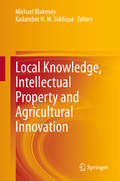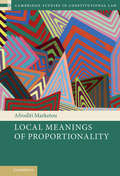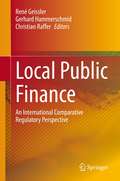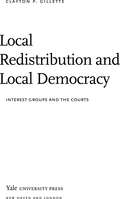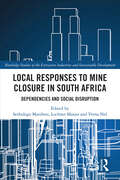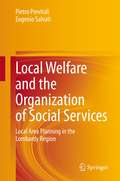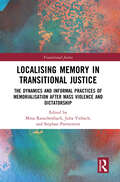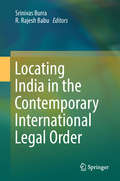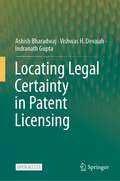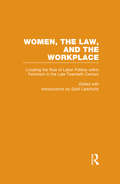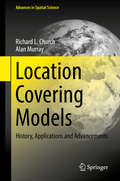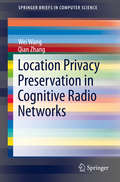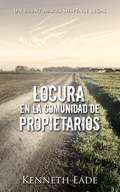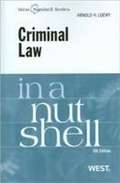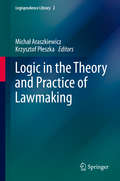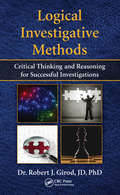- Table View
- List View
Local Knowledge, Intellectual Property and Agricultural Innovation
by Michael Blakeney Kadambot H. M. SiddiqueThis book examines the role of local knowledge in promoting agricultural innovation and legislative support for agricultural innovation through intellectual property laws and the protection of farmers’ rights. In assessing the role of intellectual property in promoting agricultural innovation the book examines plant variety rights protection, the patenting of plant varieties and plant breeding methods; gene patents and climate change; open source biotechnology and agricultural innovation and geographical indications and the marketing of agricultural products. As a test bed for the application of the themes of the book, it applies a case study approach to look at the role of local knowledge and intellectual property rights in the cultivation of traditional rice varieties in Kerala, South West India and the extent to which this cultivation is supported by Indian legislation. The book concludes with an examination of the success of self-help groups, such as Farmers’ Clubs. This book appeals to all readers interested in policies to promote sustainable agriculture at a time of increasing food insecurity. A special feature of the book is the case study approach. To date, the role of local knowledge and agricultural innovation has been almost entirely ignored and the role of intellectual property in this space has been largely ignored. The book is a result of a research collaboration between the University of Western Australia and Kerala Agricultural University, funded in part by the Australian Research Council.
Local Meanings of Proportionality (Cambridge Studies in Constitutional Law)
by Afroditi MarketouThis book offers one of the rare empirical studies on the different meanings of proportionality as part of a global constitutional discourse. It develops and applies a theoretically informed comparative methodology for the study of differences in the use of legal transfers. Beyond the transplant versus culture controversy, it enriches our understanding of the relationship between law and its social context. Beyond the common law and civil law cleavage, it provides an in-depth comparison of French, English and Greek judicial review, rendering some core features of these systems accessible to non-initiated readers. The last part of the book provides insights as to the different visions of Europe underlying different phases of European integration and thus enriches our understanding of the process of integration through law.
Local Public Finance: An International Comparative Regulatory Perspective
by René Geissler Gerhard Hammerschmid Christian RafferThis book is based upon a comparative public administration research project, initiated by the Hertie School of Governance (Germany) and the Bertelsmann Foundation (Germany) and supported by a network of researchers from many EU countries. It analyzes both the regimes and the practices of local fiscal regulation in 21 European countries. The book brings together key findings of this research project. The regulatory discussion is not limited to the prominent issue of fiscal rules but focuses on every component of regulation. Beyond this, the book covers affiliated topics such as the impact of regulation for local governments, evolution of regulation, administrative costs and crisis prevention. The various book chapters throughout provide a broad picture of local public finance regulation in theory and in practice, using different theoretical and national lenses for the analysis. Furthermore, the authors investigate the effects of budgetary constraints and higher-level regulatory efforts on local governments and on democracy and public services in every European country. This book fills a gap with respect to the lack of discussion on local government finance from an international, comparative perspective and, in particular, the regulation of local public finance. With its mix of authors, this book will be useful for practitioners as well as for scholars and for theory-driven research.
Local Redistribution and Local Democracy
by Clayton P. GilletteThe traditional theory of urban finance argues against local redistribution of wealth on the assumption that such action is likely to chase away the relatively wealthy, leaving only the impoverished behind. Nevertheless, Clayton P. Gillette observes, local governments engage in substantial redistribution, both to the wealthy and to the poor. In this thoughtful book, Gillette examines whether recent campaigns to enact "living wage" ordinances and other local redistributive programs represent gaps in the traditional theory or political opportunism. He then investigates the role of the courts in distinguishing between these explanations. The author argues that courts have greater capacity to review local programs than is typically assumed. He concludes that when a single interest group dominates the political process, judicial intervention to determine a program's legal validity may be appropriate. But if the political contest involves competing groups, courts should defer to local political judgments.
Local Responses to Mine Closure in South Africa: Dependencies and Social Disruption (Routledge Studies of the Extractive Industries and Sustainable Development)
by Lochner Marais Sethulego Matebesi Verna NelThis book investigates mine closure and local responses in South Africa, linking dependencies and social disruption. Mine closure presents a major challenge to the mining industry and government policymakers globally, but particularly in the Global South. South Africa is experiencing notable numbers of mine closures, and this book explores the notion of social disruption, a concept often applied to describe the effects of mine growth on communities but often neglecting the impact of mine closures. The book begins with three theoretical chapters that discuss theory, closure cost frameworks and policy development in South Africa. It uses evolutionary governance theory to show how mining creates dependencies and how mining growth often blinds communities and governments to the likelihood of closure. Too easily, mining goes ahead with no concern for the possibility, or indeed inevitability, of eventual closure and how mining communities will cope. These impacts are showcased through eight place-based case studies from across South Africa, one focusing on mine workers, to demonstrate that mine closure causes significant social disruption. This book will be of interest to students and scholars researching the social impacts of mining and the extractive industries, social geography and sustainable development, as well as policymakers and practitioners working with mine closure and social impact assessments.
Local Story: The Massie-kahahawai Case And The Culture Of History
by John P. RosaThe Massie-Kahahawai case of 1931-1932 shook the Territory of Hawai'i to its very core. Thalia Massie, a young Navy wife, alleged that she had been kidnapped and raped by "some Hawaiian boys" in Waikīkī. A few days later, five young men stood accused of her rape. Mishandling of evidence and contradictory testimony led to a mistrial, but before a second trial could be convened, one of the accused, Horace Ida, was kidnapped and beaten by a group of Navy men and a second, Joseph Kahahawai, lay dead from a gunshot wound. Thalia's husband, Thomas Massie; her mother, Grace Fortescue; and two Navy men were convicted of the lesser charge of manslaughter, despite witnesses who saw them kidnap Kahahawai and the later discovery of his body in Massie's car. Under pressure from Congress and the Navy, territorial governor Lawrence McCully Judd commuted their sentences. After spending only an hour in the governor's office at 'Iolani Palace, the four were set free. Local Story is a close examination of how Native Hawaiians, Asian immigrants, and others responded to challenges posed by the military and federal government during the case's investigation and aftermath. In addition to providing a concise account of events as they unfolded, the book shows how this historical narrative has been told and retold in later decades to affirm a local identity among descendants of working-class Native Hawaiians, Asians, and others--in fact, this understanding of the term "local" in the islands dates from the Massie-Kahahawai case. It looks at the racial and sexual tensions in pre-World War II Hawai'i that kept local men and white women apart and at the uneasy relationship between federal and military officials and territorial administrators. Lastly, it examines the revival of interest in the case in the last few decades: true crime accounts, a fictionalized TV mini-series, and, most recently, a play and a documentary--all spurring the formation of new collective memories about the Massie-Kahahawai case.
Local Welfare and the Organization of Social Services: Local Area Planning in the Lombardy Region
by Pietro Previtali Eugenio SalvatiThis book discusses local area planning in the Lombardy region of Italy. The book provides valuable insights about the development of local welfare systems and the territorial organization of social services through the analysis of the evolution of the Local Area Plan, which lies at the intersection of sub regional governance and of social services delivery models. Using Lombardy as a case study, this brief analyzes the structural conditions influencing the establishment of Local Area Plans, their effect on inter-municipal cooperation, and the need for possible reforms. The book is organized as follows: the first chapter presents a reconstruction of the national and regional framework, analyzing the structure of ties and opportunities within which Local Area Plans are called to act. The second chapter provides a review of the extant literature on Local Area Plans and introduces the theoretical framework used by the volume. The third chapter details legislation introduced in Lombardy to reform the governance structure of Local Area Plans by supporting a process of reorganization and aggregation. The fourth chapter presents some cases of Local Area Plan aggregation. The final chapter presents the conclusion and some brief considerations about the future of social planning. Providing an empirical analysis of local service delivery, this book will be useful to scholars and practitioners interested in public administration, welfare, local government, non-profit and public organizations, and management.
Localising Memory in Transitional Justice: The Dynamics and Informal Practices of Memorialisation after Mass Violence and Dictatorship
by Mina Rauschenbach, Julia Viebach, and Stephan ParmentierThis collection adds to the critical transitional justice scholarship that calls for “transitional justice from below” and that makes visible the complex and oftentimes troubled entanglements between justice endeavours, locality, and memory-making. Broadening this perspective, it explores informal memory practices across various contexts with a focus on their individual and collective dynamics and their intersections, reaching also beyond a conceptualisation of memory as mere symbolic reparation and politics of memory. It seeks to highlight the hidden, unwritten, and multifaceted in today’s memory boom by focusing on the memorialisation practices of communities, activists, families, and survivors. Organising its analytical focal point around the localisation of memory, it offers valuable and new insights on how and under what conditions localised memory practices may contribute to recognition and social transformation, as well as how they may at best be inclusive, or exclusive, of dynamic and diverse memories. Drawing on inter- and multi-disciplinary approaches, this book brings an in-depth and nuanced understanding of local memory practices and the dynamics attached to these in transitional justice contexts. It will be of much interest to students and scholars of memory and genocide studies, peace and conflict studies, transitional justice, sociology, and anthropology.
Locating India in the Contemporary International Legal Order
by R. Rajesh Babu Srinivas BurraThis book brings together disparate views which attempt to locate India in the contemporary international legal order. The essays endeavour to explore critically India’s role and attitude towards international law in various fields and its influence and contribution in the development of the latter. The contributions are also of historical value, as they analyse the present as part of a historical trajectory. Drawing upon the current and historical practices from their respective fields, the authors attempt to highlight some critical aspects involving India and international law. These aspects broadly underline India’s drift from its traditional role as an ally and proponent of the third world towards the pragmatism of self-interest, behaviour that is often compelled by internal political and economic conditions, as well as the dictates of external forces.
Locating Legal Certainty in Patent Licensing
by Indranath Gupta Ashish Bharadwaj Vishwas H. DevaiahThis open access book presents global perspectives and developments within the information and communication technology (ICT) sector, and discusses the bearing they have on policy initiatives that are relevant to the larger digital technology and communications industry. Drawing on key developments in India, the USA, UK, EU, and China, it explores whether key jurisdictions need to adopt a different legal and policy approach to address the unique concerns that have emerged within the technology-intensive industries. The book also examines the latest law and policy debates surrounding patents and competition in these regions. Initiating a multi-faceted discussion, the book enables readers to gain a comprehensive understanding of complex legal and policy issues that are beginning to emerge around the globe.
Locating Nature: Making and Unmaking International Law
by Julia Dehm Usha NatarajanFor those troubled by environmental harm on a global scale and its deeply unequal effects, this book explains how international law structures ecological degradation and environmental injustice while claiming to protect the environment. It identifies how central legal concepts such as sovereignty, jurisdiction, territory, development, environment, labour and human rights make inaccurate and unsustainable assumptions about the natural world and systemically reproduce environmental degradation and injustice. To avert socioecological crises, we must not only unpack but radically rework our understandings of nature and its relationship with law. We propose more sustainable and equitable ways to remake law's relationship with nature by drawing on diverse disciplines and sociocultural traditions that have been marginalized within international law. Influenced by Third World Approaches to International Law (TWAIL), postcolonialism and decoloniality, and inspired by Indigenous knowledges, cosmology, mythology and storytelling, this book lays the groundwork for an epistemological shift in the way humans conceptualize the relationship between law and nature.
Locating the Role of Labor Politics within Feminism in the Late Twentieth Century: Women, the Law, and the Workplace (Controversies in Constitutional Law)
by Sybil LipschultzEqual rights for women in the workplace is a critical aspect of the twentieth century civil rights movement, as well as an issue of academic and public interest. Bringing together legal rulings and commentary, this three-volume collection documents the development of legal protections for women in the workplace. The comprehensive coverage encompasses the major legal and constitutional issues, including the legal arguments that lead to the reduction of working hours for women and the argumentation that framed the debates over minimum wage legislation. The set also presents more contemporary issues of gender equality versus gender difference, in matters such as maternity leave and health hazards in the workplace for pregnant women. As the interest in the intersection of law and women's studies surges, this important new collection will become an essential guide to students and scholars, as well as lay readers. This volume is available on its own or as part of the three-volume set, Women, the Law, and the Workplace. For a complete list of the volume titles in this set, see the listing for Women, the Law, and the Workplace [0-415-94280-2].
Location Covering Models: History, Applications and Advancements (Advances in Spatial Science)
by Alan Murray Richard L. ChurchThis book provides a thoughtful and rigorous guide to coverage modeling, reviewing essential models, solution approaches, and related applications. Since the early developments of the Location Set Covering Problem and the Maximal Covering Location Problem, models based upon some form of coverage have been extended and applied in a number of areas, helping to improve services offered to citizens of large cities and regions. Examples include trauma care services, transit systems design, cell tower location, and many others. The book not only describes the strengths and weaknesses of currently available models, but also presents details on major developments, including solution procedures and applications, making it well suited both as a reference text and a textbook for graduate level courses.
Location Privacy Preservation in Cognitive Radio Networks
by Wei Wang Qian ZhangThis brief focuses on the current research on location privacy preservation in cognitive radio networks (CRNs). Along with a review of the existing works, this book includes fundamental privacy models, possible frameworks, useful performance, and future research directions. It explores privacy preservation techniques, collaborative spectrum sensing, database-driven CRNS, and modeling potential privacy threats. Conflicts between database owners and unlicensed users can compromise location privacy, and CRNs are a means to mitigate the spectrum scarcity issue due to the increasing demand for wireless channel resources. By examining the current and potential privacy threats, the authors equip readers to understand this developing issue. The brief is designed for researchers and professionals working with computer communication networks and cognitive radio networks. Graduate students interested in networks and communication engineering will also find the brief helpful.
Lochner v. New York: Economic Regulation on Trial
by Paul KensLochner v. New York (1905), which pitted a conservative activist judiciary against a reform-minded legislature, remains one of the most important and most frequently cited cases in Supreme Court history. In this concise and readable guide, Paul Kens shows us why the case remains such an important marker in the ideological battles between the free market and the regulatory state.
Lockdown America
by Christian ParentiLockdown America documents the horrors and absurdities of militarized policing, prisons, a fortified border, and war on drugs. Its accessible and vivid prose makes clear the links between crime and politics in a period of gathering economic crisis.
Lockdown: Social Harm in the Covid-19 Era
by Daniel Briggs Justin Kotzé Anthony Lloyd Anthony Ellis Luke TelfordThis book asks whether the decision to lock down the world was justified in proportion to the potential harms and risks generated by the Covid-19 virus. Drawing on global, empirical data, it explores and exposes the social harms induced by lockdowns, many of which are 'hidden', including joblessness, mental health problems and an intensification of societal inequalities and divisions. It offers data-driven case studies on harms such as domestic violence, child abuse, the distress of being ordered to stay at home, and the numerous harms associated with the new wealth industries. It explores why some people weren't compliant with lockdown restrictions and examines the already vulnerable social groups who were disproportionally affected by lockdown including those who were locked in (care home residents), locked up (prisoners), and locked out (migrant workers, refugees). The book closes with a brief discussion on what the future might look like as we enter a post-Covid world, drawing on cutting-edge social theory.
Locked Down, Locked Out: Why Prison Doesn't Work and How We Can Do Better
by Maya SchenwarThrough the stories of prisoners and their families, including her own family's experiences, Maya Schenwar shows how the institution that locks up 2.3 million Americans and decimates poor communities of color is shredding the ties that, if nurtured, could foster real collective safety. As she vividly depicts here, incarceration takes away the very things that might enable people to build better lives. But looking toward a future beyond imprisonment, Schenwar profiles community-based initiatives that successfully deal with problems—both individual harm and larger social wrongs—through connection rather than isolation, moving toward a safer, freer future for all of us.
Locking Up Our Own: Crime And Punishment In Black America
by James FormanFormer public defender James Forman, Jr. is a leading critic of mass incarceration and its disproportionate impact on people of color. In Locking Up Our Own, he seeks to understand the war on crime that began in the 1970s and why it was supported by many African American leaders in the nation’s urban centers. <p><p> Forman shows us that the first substantial cohort of black mayors, judges, and police chiefs took office amid a surge in crime and drug addiction. Many prominent black officials, including Washington, D.C. mayor Marion Barry and federal prosecutor Eric Holder, feared that the gains of the civil rights movement were being undermined by lawlessness—and thus embraced tough-on-crime measures, including longer sentences and aggressive police tactics. In the face of skyrocketing murder rates and the proliferation of open-air drug markets, they believed they had no choice. But the policies they adopted would have devastating consequences for residents of poor black neighborhoods. <p><p> A former D.C. public defender, Forman tells riveting stories of politicians, community activists, police officers, defendants, and crime victims. He writes with compassion about individuals trapped in terrible dilemmas—from the men and women he represented in court to officials struggling to respond to a public safety emergency. Locking Up Our Own enriches our understanding of why our society became so punitive and offers important lessons to anyone concerned about the future of race and the criminal justice system in this country.
Lockout-Tagout: Verriegelung Von Stellgliedern Zur Umfassenden Wartungssicherung Von Maschinen (essentials)
by Lars Schnieder Tim-Colin UhdeDas Inverkehrbringen und der Betrieb von Maschinen erfordern, das Einhalten von (Sicherheits-)Anforderungen zu dokumentieren, in Gefährdungsbeurteilungen das Risiko zu ermitteln, Schutzmaßnahmen abzuleiten und umzusetzen. Trotz des einheitlichen Rechtsrahmens kommt es gerade bei Instandhaltungsarbeiten weiterhin zu schweren Arbeitsunfällen, z.B. durch unkontrolliert austretende Energien wegen deaktivierter Schutzmechanismen. Die Autoren führen in den Rechtsrahmen der Maschinen- und Betriebssicherheit ein und leiten daraus die wichtige Absicherung unkontrollierter Energiequellen während der Instandhaltung ab. Mit Lockout-Tagout stellen sie ein anerkanntes Verfahren zur Verbesserung der Betriebssicherheit vor. Hierzu kombinieren die Autoren Verfahrensanweisungen, technische Maßnahmen und Schulungen mit einer kontinuierlichen Überwachung der Wirksamkeit der Maßnahmen.Die AutorenDr.-Ing. Lars Schnieder verantwortet in einer Software-Entwicklungsfirma das Geschäftsfeld Sicherheitsbegutachtung. Er ist international als Sachverständiger für die Maschinen- und Betriebssicherheit tätig.Tim-Colin Uhde ist in dieser Firma als Sachverständiger für die Maschinen- und Betriebssicherheit tätig.
Lockout-Tagout: Verriegelung von Stellgliedern zur umfassenden Wartungssicherung von Maschinen (essentials)
by Lars Schnieder Tim-Colin UhdeDas Inverkehrbringen und der Betrieb von Maschinen erfordern, das Einhalten von (Sicherheits-)Anforderungen zu dokumentieren, in Gefährdungsbeurteilungen das Risiko zu ermitteln, Schutzmaßnahmen abzuleiten und umzusetzen. Trotz des einheitlichen Rechtsrahmens kommt es gerade bei Instandhaltungsarbeiten weiterhin zu schweren Arbeitsunfällen, z.B. durch unkontrolliert austretende Energien wegen deaktivierter Schutzmechanismen. Die Autoren führen in den Rechtsrahmen der Maschinen- und Betriebssicherheit ein und leiten daraus die wichtige Absicherung unkontrollierter Energiequellen während der Instandhaltung ab. Mit Lockout-Tagout stellen sie ein anerkanntes Verfahren zur Verbesserung der Betriebssicherheit vor. In der 2. Auflage dieses Buches wurde die systematische Vorgehensweise zur Umsetzung eines Programms zur Gefährdungsbeherrschung von Betreibern von Maschinen grundlegend erweitert und ergänzt. Hierzu kombinieren die Autoren Verfahrensanweisungen, technische Maßnahmen und Schulungen mit einer kontinuierlichen Überwachung der Wirksamkeit der Maßnahmen.
Locura en la Comunidad de Propietarios
by N. S. Kenneth EadeLa presidenta de la Comunidad de Propietarios de Orange Grove es asesinada, y hay varios sospechosos; de hecho, todos los que viven en Orange Grove. El abogado Brent Marks cree que se trata de un típico caso de defensa por una ejecución hipotecaria, hasta que su clienta queda implicada en el delito y llama a Brent para defenderla. Para empeorar las cosas, el destino de otro cliente está por cruzarse en sus caminos. ¿Brent defiende a una clienta inocente o culpable? En la encrucijada de integridad y ética, el drama judicial explota en la sala del tribunal, mientras que fuera de la sala la acción se sale de control. Aclamado por la crítica: "HOA Wire combina delito y sala del tribunal con tal éxito que la inesperada conclusión se convierte tanto en un resultado exitoso y lógico como en una verdadera sorpresa. Con un conocimiento real sobre los procedimientos de las Comunidades de Propietarios y las peleas entre vecinos, HOA Wire es una investigación diestra sobre la ética abogado-cliente puesta en riesgo, y es lo mejor en literatura sobre delito/drama judicial". Midwest Book Review "HOA Wire, de Kenneth Eade, es un libro muy bueno, escrito por un abogado. Una combinación de drama judicial y delito, está lleno de idas y vueltas, y tiene un final muy sorprendente. Es una historia fascinante, que cambia de dirección en cada esquina". Reader's Favorite "Delito, traición, preguntas que hacen pensar relacionadas con la ética y la integridad; esta novela tiene todo lo que necesita para convertirse en una lectura obligada para cualquier amante de la verdadera literatura criminal". Top Books Worth Reading "HOA Wire es mucho más que una novela criminal intrigante y vertiginosa; es un drama judicial que les traerá a los lectores el recuerdo de las revistas de thrillers y los tendrá pegados a las páginas. Eade es brillante cuando se trata de crear historias complicadas e interesante
Loewy's Criminal Law In A Nutshell (Fifth Edition)
by Arnold H. LoewyThis guide helps you gain an overview of and develop perspective on the area of criminal law. It is organized into eight sections for quick reference. Expert discussion explores punishment, specific crimes, and the ingredients of a crime such as mens rea and actus reus. Other topics covered include special defenses, the burden of proof, and inchoate and group criminality. It also reflects on the limitations of criminal law.
Logic in the Theory and Practice of Lawmaking
by Michał Araszkiewicz Krzysztof PłeszkaThis book presents the current state of the art regarding the application of logical tools to the problems of theory and practice of lawmaking. It shows how contemporary logic may be useful in the analysis of legislation, legislative drafting and legal reasoning concerning different contexts of law making. Elaborations of the process of law making have variously emphasised its political, social or economic aspects. Yet despite strong interest in logical analyses of law, questions remains about the role of logical tools in law making. This volume attempts to bridge that gap, or at least to narrow it, drawing together some important research problems--and some possible solutions--as seen through the work of leading contemporary academics. The volume encompasses 20 chapters written by authors from 16 countries and it presents diversified views on the understanding of logic (from strict mathematical approaches to the informal, argumentative ones) and differentiated choices concerning the aspects of law making taken into account. The book presents a broad set of perspectives, insights and results into the emerging field of research devoted to the logical analysis of the area of creation of law. How does logic inform lawmaking? Are legal systems consistent and complete? How can legal rules be represented by means of formal calculi and visualization techniques? Does the structure of statutes or of legal systems resemble the structure of deductive systems? What are the logical relations between the basic concepts of jurisprudence that constitute the system of law? How are theories of legal interpretation relevant to the process of legislation? How might the statutory text be analysed by means of contemporary computer programs? These and other questions, ranging from the theoretical to the immediately practical, are addressed in this definitive collection.
Logical Investigative Methods: Critical Thinking and Reasoning for Successful Investigations
by Robert J. GirodThis book describes how to use logic, reasoning, critical thinking, and the scientific method to conduct and improve criminal and civil investigations. The author discusses how investigators and attorneys can avoid assumptions and false premises and instead make valid deductions, inductions, and inferences. He explains how tools such as interview and interrogation can be used to detect deception and profile unknown individuals and suspects. The book is aimed at improving not only the conduct of investigations, but also the logical use of cognitive, analytical, documentation, and presentation tools to win cases.
